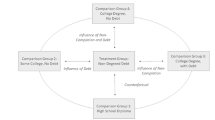Abstract
The cost of education is rising, increasing student financial aid and debt for students pursuing higher education. A few studies have assessed the impact of student debt in medicine, physical therapy and social work, but little is known about the impact of student debt on genetic counseling students and graduates. To address this gap in knowledge, a web-based study of 408 recent alumni of genetic counseling programs in North America was conducted to assess the impact of student debt on program, career and life choices. Over half (63 %; n = 256/408) of the participants reported that loans were extremely important in their ability to attend their training program, with most using subsidized loans no longer available to current graduate students. While participants were generally satisfied with their genetic counseling education, 83 % (n = 282/342) of participants with student debt reported feeling burdened by their debt, which had a median of $40,000–$50,000. This debt is relatively close to the median starting salary reported by survey participants ($45,000–$50,000), breaching the “20-10 rule” that states student debt should not exceed 20 % of annual net income. In response to this critical issue, we propose recommendations for the genetic counseling field that may help alleviate student debt impact and burden.






Similar content being viewed by others
References
Avery, C., & Turner, S. (2012). Student loans: do college students borrow too much—or not enough? The Journal of Economic Perspectives, 26(1), 165–192.
Baum, S., & O’Malley, M. (2003). College on credit: how borrowers perceive their education debt. NASFAA Journal of Student Financial Aid, 33(3), 7–19.
Baum, S., & Schwartz, S. (2006). How much debt is too much? Defining benchmarks for manageable student debt. New York: The College Board.
Devito, A. (Director) (2010, February 9). Discussion on grad student loans, savings, and building a financial future. Professional Development Workshop Series. Lecture conducted from Fordham University, New York, New York.
Gicheva, D. (2011). Does the student-loan burden weigh into the decision to start a family? University of North Carolina at Greensboro, Department of Economics Working Papers 11–14.
Jamrisko, M., & Kolet, I. (2012, August 15). Cost of college degree in U.S. soars 12 fold: Chart of the day - Bloomberg. Bloomberg - Business, Financial & Economic News, Stock Quotes. Retrieved May 21, 2013, from https://doi.org/www.bloomberg.com/news/2012-08-15/cost-of-college-degree-in-u-s-soars-12-fold-chart-of-the-day.html.
Jungbluth, C., MacFarlane, I. M., McCarthy Veach, P., & LeRoy, B. S. (2011). Why is everyone so anxious?: An exploration of stress and anxiety in genetic counseling graduate students. Journal of Genetic Counseling, 20, 270–286.
National Society of Genetic Counselors. (2012, October 23). National Society of Genetic Counselors 2013–2015 strategic plan.
National student loan two-year default rates. U.S. Department of Education. Web. 13 March 2013. https://doi.org/www2.ed.gov/offices/OSFAP/defaultmanagement/defaultrates.html.
Renner, D., Westfall, J., Wilroy, L., & Ginde, A. (2010). The influence of loan repayment on rural healthcare provider recruitment and retention in Colorado. Journal of Rural and Remote Health Research, 10(4), 1605.
Rothstein, J., & Rouse, C. (2011). Constrained after college: student loans and early career occupational choices. Journal of Public Economics, 85(5), 1299–1317.
Student Loan Repayment Calculator | Financial Calculator | Credit.org. (n.d.). Springboard Debt Counseling, Credit Counseling, CCCS | Credit.org. Retrieved March 7, 2013, from https://doi.org/credit.org/calculators/repaying-student-loans/.
The Budget Control Act of 2011. (2011, August 1). The Budget Control Act of 2011. Retrieved February 12, 2013, from https://doi.org/www.gpo.gov/fdsys/pkg/BILLS-112s365eah/pdf/BILLS-112s365eah.pdf.
Thompson, K., Coon, J., & Handford, L. (2011). Financing physical therapy doctoral education: methods used by entry-level students and the financial impact after graduation. Journal of Allied Health, 40(4), 169–173.
Trends in College Pricing. (2012). The College Board Advocacy and Policy Center. Retrieved February 23, 2013. https://doi.org/advocacy.collegeboard.org/sites/default/files/college-pricing-2012-full-report_0.pdf
Yoon, I. (2012). Debt burdens among MSW graduates: a national cross-sectional study. Journal of Social Work Education, 48(1), 105–125.
Acknowledgments
We gratefully appreciate the expertise of John Stevenson at the UW Survey Center and Inate Yoon for their help with survey development, and to Susan Fischer at the Financial Aid Office at the University of Wisconsin – Madison. We thank, Amy Lemke for her insightful comments and suggestions. Funding for the survey incentive was provided by an institutional (233) gift account through the University of Wisconsin – Madison Genetic Counseling Training Program.
Disclosure of Interest
The authors declare no conflict of interest. The authors have full control of the primary data, which is available for review by the journal if requested.
Author information
Authors and Affiliations
Corresponding author
Rights and permissions
About this article
Cite this article
Kuhl, A., Reiser, C., Eickhoff, J. et al. Genetic Counseling Graduate Student Debt: Impact on Program, Career and Life Choices. J Genet Counsel 23, 824–837 (2014). https://doi.org/10.1007/s10897-014-9700-0
Received:
Accepted:
Published:
Issue Date:
DOI: https://doi.org/10.1007/s10897-014-9700-0




